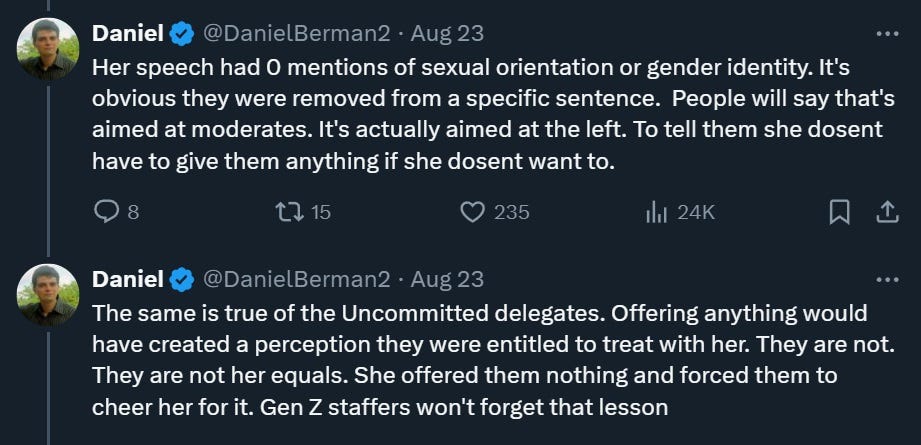Roundup for the week | And why it took me 15 minutes to code a small app but >5 hours to deploy it
AI pilots are sharing salary info with everyone, a crispy sunset house song, Telegram misconceptions and truths, and infrastructure is now the hardest part of launching software.
What caught my eye
AI Copilots are running into a funny problem at big companies:
Particularly around bigger companies that have complex permissions around their SharePoint or their Office 365 or things like that, where the Copilots are basically aggressively summarizing information that maybe people technically have access to but shouldn't have access to," he explained.
For example, salary information, or sensitive projects in progress. This is another one of those situations where the technology is there, but other problems stop it from being deployed quickly or thoroughly.
Your Apple Watch charger will charge your AirPods case! Game changer. Only works for AirPods Pro 2 and later.
Quite worrying first point in this article about Germany.
Overall, this paints a picture of a country whose leaders, elites, and voting public are deeply unserious. Instead of addressing the country’s myriad challenges, they are choosing to dither, bury their heads in the sand, indulge in comforting fantasies, and look out for themselves instead of for the national interest. As a result, things are getting worse, both for Germany and for Europe itself.
Also, there is a lot to like about the moderate direction the US Democratic party has taken. Man, I really hope Harris wins. About Harris’ speech at the DNC:
By the way, why are the two female US Presidential candidates so far usually referred to by their first names? For Hillary Clinton there is a case to be made that it avoids confusion with Bill. But what about Kamala?
After a 5 minute exploration, it turns out that:
There is also Bernie, who is a man
She said: “Just call me Kamala”
She uses “Kamala” as backdrop branding (but also Harris)
Verdict: No misogyny, just coincidence. I go into these small rabbit holes so you don’t have to!
Shazammed this in a ZARA store, of all places. This is the kind of track I used to play a lot in my DJ era. Crisp, groovy, happy, a touch of melancholy. On repeat!
Telegram CEO Pavel Durov was arrested in France. Telegram has puzzled me for years. A lot of people seem to think it is encrypted, and even prefer it over WhatsApp for this reason. But it’s been very easy to know that Telegram is in-fact not, by default, encrypted end-to-end, and group chats never are. Every message that gets sent on a Telegram group chat can be read by Telegram employees.
Telegram has caught lots of flak over this for close to a decade. And it’s one of those topics that I’ve gotten into near fights over a couple of times with people who claim its more secure than WhatsApp. In any case, it seems right to speculate why exactly the CEO was arrested. There has to be at least some political motivation, because Telegram is widely known to be used by the Russian Military in Ukraine. It’s also apparently a cesspool of harmful content. But I find it quite absurd that there is a cohort of people, including Elon Musk, who are loudly proclaiming that Durov was arrested because he offered encryption, and therefore this is an attack on free speech.
It’s more likely the opposite. Since Telegram is NOT encrypted, the company can actually see everything that’s being sent on their platform. They are in a position to do something about all the child porn and extremist content, but they choose not to. Also, because it is NOT encrypted, governments can try to force them to grant access, which would help police go after organized crime, as well as spy on the Russians.
This highlights to me, a number of things:
Elon Musk among others proves again that he really just uses everything that happens as a way to push his own agenda, or make random points. Hence, facts are important to him only to the degree in which they can help him push his agenda. Total bad faith actor.
This is an interesting battle as part of Cold War 2. High likelihood this is at least partly about blocking off a vital comms channel for the Russians.
This underscores the importance of End-to-End (E2E) encryption for those that really care about free speech. Signal, WhatsApp and other alternatives cannot be strong-armed by police in this way, because they themselves simply cannot see what gets sent through their platform.
For the record:
Telegram chats are not E2E encrypted by default. In private chats users can opt-in to E2E encryption, but group chats are never encrypted.
WhatsApp chats are E2E encrypted by default, including groups, but being part of Meta it is probably selling your metadata (where you are, how often you message, etc) to advertisers.
Signal is the app that people seem to think Telegram is. It is highly private, E2E encrypted and does not sell metadata. It is a non-profit funded by donors.
Original thoughts
Infrastructure is now the hard part of launching apps. There is a lot of derision around “GPT Wrappers”, or companies that only create a front-end that calls the ChatGPT API on the backend. But at the same time, there is a whole ecosystem of, essentially, AWS wrappers like Vercel. AWS and Google Cloud (GCP) are complicated and have horrible UIs. All these no-code and low-code founders building stuff with and for AI, run into the problem that while coding is now much easier, getting an app from running on your local environment to running in the cloud, securely, without going down is still a lot of work.
I experienced this myself last week. For a couple of months, I’d been paying for numerous.ai, a simple addon for google sheets that allows you to call ChatGPT directly from a sheet with a formula. It helps me do a bunch of stuff at work much faster. After experiencing another success with writing an AppScript to call the Zendesk API and automate something that took a team mate 2 hours per week, I suddenly decided to create my own google sheets AI add-on. It took me less than 15 minutes to get the script to work on my own computer. In my sheets, I can use the new formula =perplexity(“prompt”, {cell reference}) and the output from the Perplexity API gets returned into the cell.
That night I spent close to 5 hours to try and get this deployed on GCP as an add-on, because that is the only way to run it across all of my sheets. I ran out of time. It’s still not working. While working through this task, I ran into absurd bugs that my AI copilot had no idea about.
The order of signing into my 2 google accounts meant my test version would fail to work, no matter what. Because at one point, months ago I had logged into my Carousell account first, and then into my gmail account. Google considered the first one to be my ‘default’ account. But of course I had made my script on my personal account. It took me 2.5 hours to try and retry every way to solve the errors I was getting. Finally, I came across someone who had the same problem and the answer. Log out of all your google accounts, and first log into the account that has the add-on. There is no AI that could have figured this out. Now I know.
There is a bug in google sheets that prevents editor add-ons to work in test deployments. The verdict is out on this one, but even after solving the above my custom formula is not being loaded at all in my test deployment. My next step is to actually just deploy the add-on and see if it works in production (I’m pretty sure it will), but to do that I need to record a video for Google to explain how it works and what data I’m using.
This is a pain in the ass. It’s not that fun. It requires trial and error, patience and a huge appetite for midnight oil.
Companies like Vercel abstract much of this away by making it far easier to deploy your code. But under the hood they are using AWS or GCP. So that abstraction comes with a price tag. Having seen our AWS cost escalate over time with Ox Street, I wonder what the P&Ls of companies that build in this no-code / low-code way are going to look like at scale. Basecamp did a full-on cloud exit recently, to save $7m on infra cost. Engineers all know this. It was actually mind blowing to me. I genuinely thought the scale benefits were passed through to customers to such a degree that cloud infra would be competitive almost no matter the scale.
Now I wonder to what degree no-code and low-code is the future. If coding itself gets easier with AI, something like Bubble seems to have somewhat dubious value. But just from a business economics standpoint: sure it’s cool that you can now build stuff as an indiehacker that used to take a big team. But if you’re paying all the money you save in headcount out to SaaS tools, things might be worse.
These tools are usage based, see Vercel’s pricing page. In my time I have seen several tools: AWS, Algolia, and Amplitude start to get out of hand due to increasing usage.
Beware usage based pricing, and don’t forget to consider hiring a human instead.



